Every era in Blyth Spartans history has players adored and idolised by the supporters, in the post WWII years goalkeeper Harry Mills was that player.
The supporter who went on to play for the club and became a cult hero.
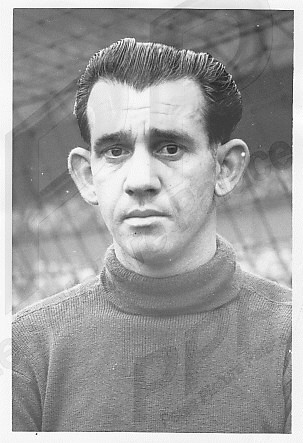 Henry Owen Mills was born in Blyth on 23rd August 1922, at Chapel Row in Cambois.
Henry Owen Mills was born in Blyth on 23rd August 1922, at Chapel Row in Cambois.
It was as a 14 year old schoolboy that Harry first made his name, he was goalkeeper for the Blyth Boys side that remarkably fought its way through seven rounds of the prestigious English School Shield in the 1935/36 season.
Their run came to a galant end losing to West Ham Boys in front of 8,500 packed into Croft Park.
After leaving school Harry continued with his football, showing great promise as he progressed playing for Cambois Welfare Juniors, Shankhouse Welfare and Sleekburn A Pit Welfare.
He was offered trial by Bradford City but nothing came of it and then the outbreak of the war halted his career.
Aged 21 he enlisted and served in the Eight Army in North Africa. While serving he kept in touch with events at home receiving a monthly bundle of newspapers from his family. The Blyth News was one of those newspapers and it enable him to follow the fortunes of Blyth Shipyard FC’s great 1945/46 season in the Northern Combination.
Fighting in North Africa didn’t entirely stop his football, he did manage to play in four games the soldiers arranged on improvised desert pitches. He even traveled to Tripoli to watch an RAF versus Royal Navy showpiece game that was packed with many well known star footballers serving their country.
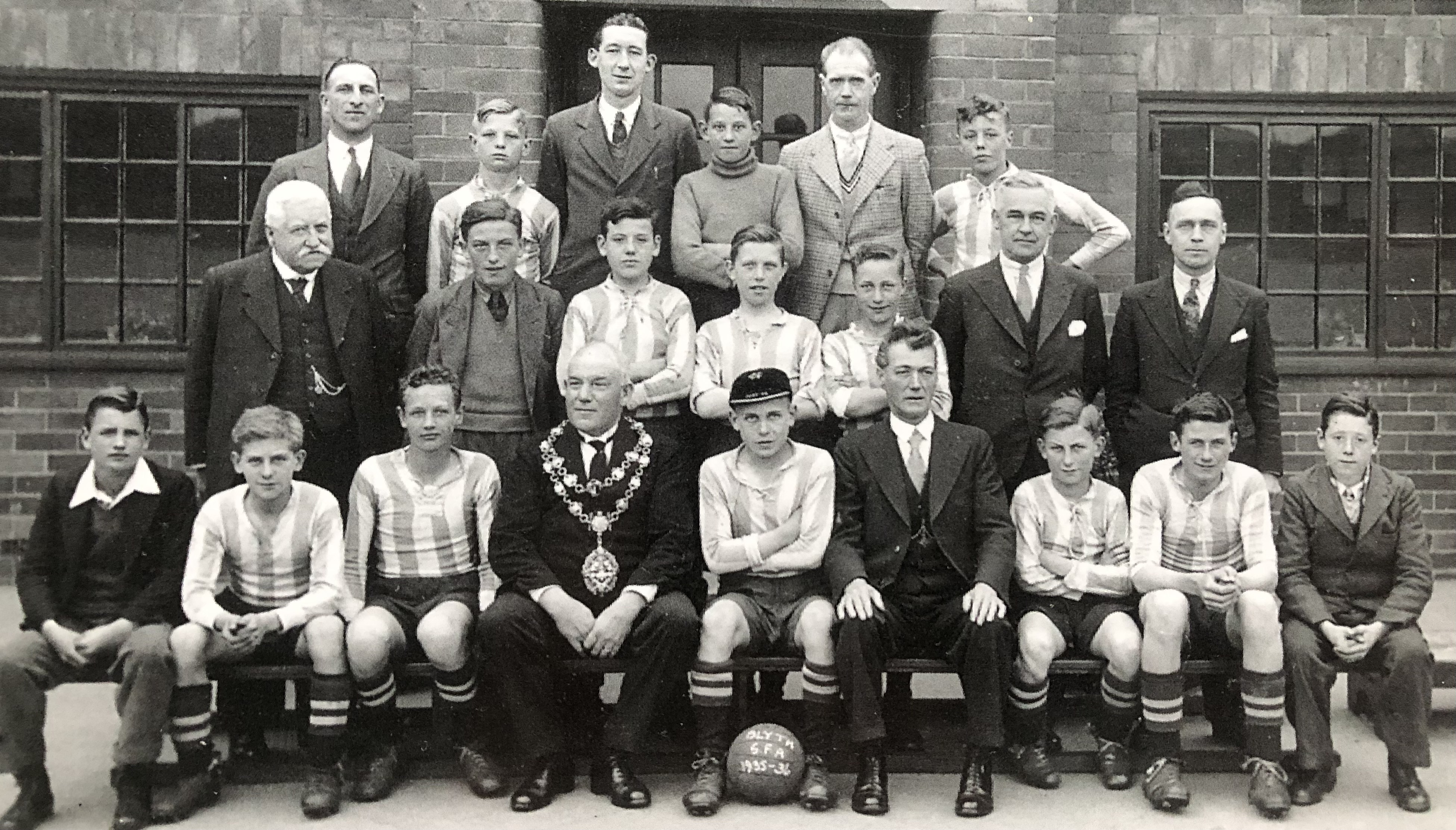
Harry in the back row of the famous Blyth Schools team of 1935/36.
- It was a letter home to the sports editor of the Blyth News, Bob Thompson aka Crofter, dated June 24th 1943 in which he told of how he became a goalkeeper, and it wasn’t out of his choice!
He told of how, while serving in North Africa he had crossed paths with a former school friend, Dickie Wilson. They recalled how their footballing careers had swapped paths one afternoon at St Wilfreds Roman Catholic School. Both played for the school junior team, Harry at outside left and Dickie as the goalkeeper.
However one afternoon their efforts didn’t impress the sports teacher Mr Gerald Kelly. Harry admitted their ‘standard of play in those position wasn’t very high’, Mr Kelly wasn’t too impressed either and eventually swapped their positions.
Harry stated that:
“Any progress we have made since those good old days we owe to Mr Gerald Kelly our sports teacher, who persevered with us when others would have long since given it up on us”.
He ended the letter saying:
‘I’m just longing to get back home and play football again on Croft Park as I’m hoping to get a chance to play for the Spartans, my favourite team’.
After being demobilised in October 1945 he was signed by Brentford as an amateur, they had played throughout the war years in the London War League but Harry returned to the North East in 1946.
The letter he sent to the Blyth News proved a shrewd move, reporter Bob Thompson was a highly influential figure within the Spartans and had even run of the Reserve team before the war.
He invited Harry to play in the pre season matches, on Saturday 17th August 1946 he finally got his wish to play on Croft Park.
Harry played in the first of the traditional pre season Green and Whites against the Claret and Blues practise matches. Keeping goal for the Claret and Blues who won 7-6, several players were missing due to prior commitments, some playing cricket and others being involved in ‘professional foot handicaps’ – sprint races which were hugely popular and lucrative for the winners.
Club officials already had one keeper in mind, former Reserve and Blyth Shipyard player Billy Goulding, his family had long standing ties with the club but he wasn’t available due his cricket commitments.
That played to Harry’s advantage, on Saturday 24th August the club held its final practise match at Croft Park, some 25 players were used across the two teams as the Green and Whites won 5-0.
Harry played for the Green and Whites, who were made up of the first choice players, stealing a march on Billy Goulding who missed another practise match.
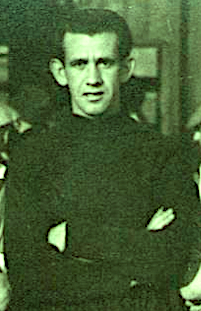 The clubs first game after reforming post war came on Saturday 31st August 1946, Harry was deservedly picked as first choice keeper playing in the 1-1 with North Shields Reserves at Croft Park while Goulding played for the Reserves in a 4-5 North East Alliance defeat at Barrington United.
The clubs first game after reforming post war came on Saturday 31st August 1946, Harry was deservedly picked as first choice keeper playing in the 1-1 with North Shields Reserves at Croft Park while Goulding played for the Reserves in a 4-5 North East Alliance defeat at Barrington United.
Harry went onto play in the first eleven game of the season, keeping three clean sheets as the Spartans won seven of the eleven games.
Following the 2-3 Northern Alliance Cup defeat away at Ashington club officials decided to change the keepers with Billy Goulding coming into the first team and Harry playing for the Reserves.
After ten games for the Reserves his chance to play first team football again came again on Saturday 11th January 1947.
Illness ruled Billy Goulding out of the home game against West Sleekburn, Harry kept a clean sheet in the 4-0 win and kept his place for the rest of the season.
In the return game against West Sleekburn on Saturday 22nd March, he saved his first penalty for the Spartans but unfortunately his 89th minute heroics were in vain as the home side were already 3-1 up at the time!
A late equaliser by league leaders Newburn in the 2-2 Croft Park draw on Saturday 17th May, effectively ended the Spartans hopes of catching the Tynesiders and saw Harry pick up a Northern Alliance Runners Up medal in his first season with the club.
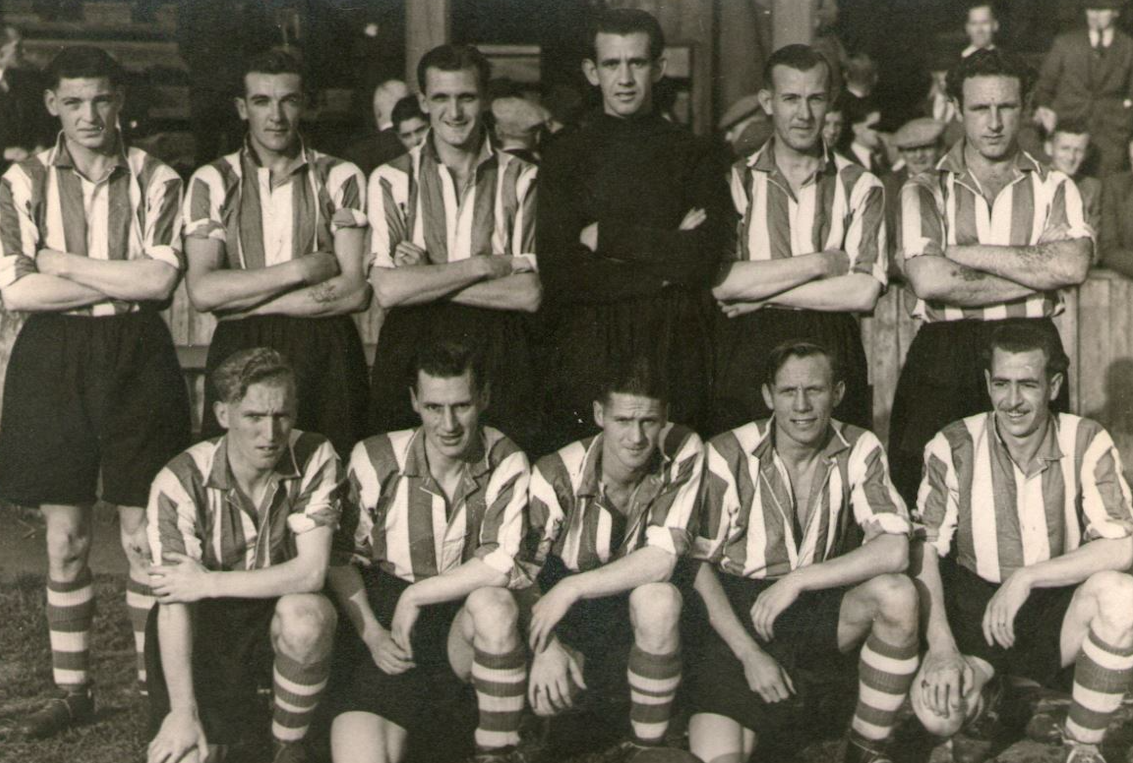 1947/48 saw Blyth return to the North Eastern League with 25 year old Harry now firmly established as first choice keeper.
1947/48 saw Blyth return to the North Eastern League with 25 year old Harry now firmly established as first choice keeper.
He played in the FA Cup for the first time on Saturday 20th September, keeping a clean sheet in the 2-0 Preliminary Round win at Birtley Town and again in 1st Qualifying Round 4-0 home win over Throckley Welfare.
The step up in level certainly brought out the best in him under guidance of the club’s new Player/Coach Joe Wilson. In the run up to the much anticipated festive fixtures Blyth won four games without Harry conceding a goal, recording 2-0, 5-0, 4-0 and 3-0 wins.
The Boxing Day derby at Ashington attracted a 8,000 crowd for the 1-1 draw, with 5,000 attending the New Years Day return game at Croft Park which the visitors won 0-4, it was only the second time ever Harry had ever let that many in in a single game!
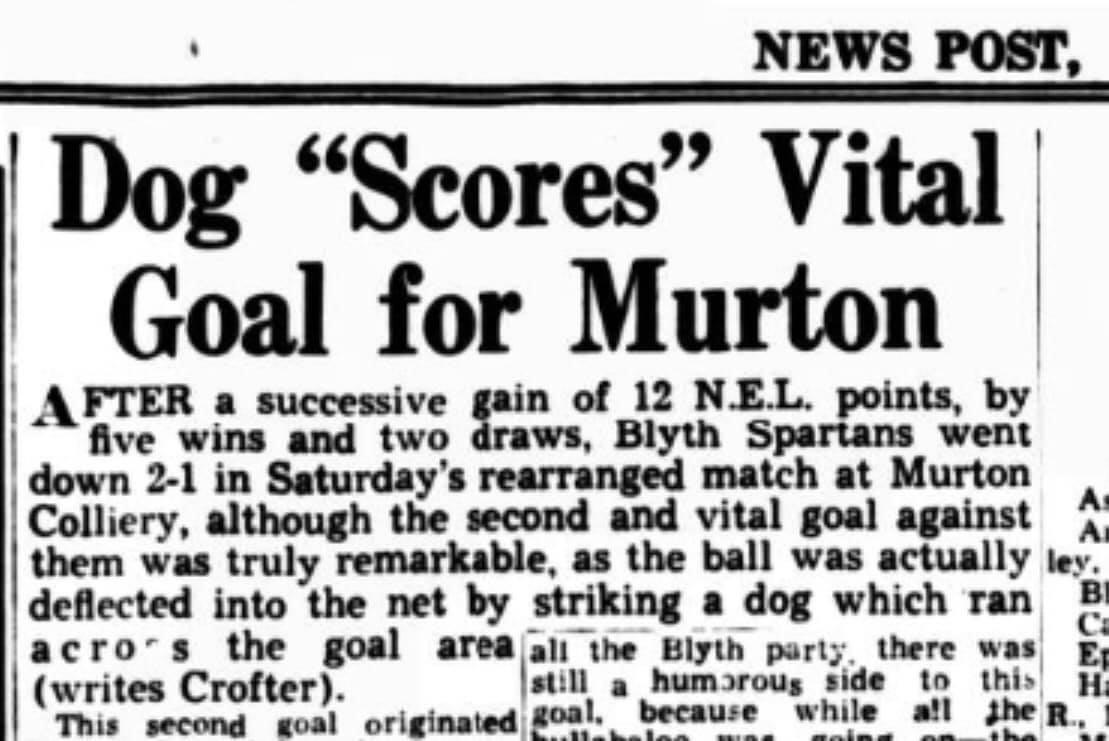 The most bizarre goal he ever conceded came on Saturday 27th December 1947 when Blyth played Murton Colliery Welfare away.
The most bizarre goal he ever conceded came on Saturday 27th December 1947 when Blyth played Murton Colliery Welfare away.
Trailing 0-1 from the 6th minute after the gale force wind caught a cross and blew the ball over Harry into the net, it got more bizarre in the 30th minute.
A right wing cross was swung in, as Blyth’s experienced Player Manager Joe Wilson set himself to clear a dog ran on the pitch across the path of the ball. The ball struck the dog and deflected passed Harry into the net!.
To the amazement of the Blyth players the referee G. Smith of County Durham awarded the goal even after their protests insisting it was Wilson who had put the ball passed Harry into the net. Blyth officials appealed the result to the Northern Eastern League’s management committee but with the only the referee’s account to available the decided the result would stand.
 Blyth officials wanted to bring Billy Fenwick back to the club in December 47 and approached his club Ashington but they wanted Harry in exchange!
Blyth officials wanted to bring Billy Fenwick back to the club in December 47 and approached his club Ashington but they wanted Harry in exchange!
Aware of others clubs interest in their star player Blyth weren’t prepared to let him leave in an exchange deal. Ashington stood firm, it was Mills for Fenwick or the deal wouldn’t happen.
It never happened, Billy Fenwick eventually handed in a transfer request to try and force through a return to Croft Park but Ashington sold selling him to North Shields instead.
Harry had become renowned for his ability and willingness to dive at players feet to retrieve the ball. However, on Saturday 31st January his bravery led to him being stretchered off!
Trailing 1-3 at home Murton CW he jumped to claim a cross, he then slipped on the muddy goalmouth as he landed. The ball landed at the feet of Murton outside left Bob Holland the far post, Harry instinctively lunged at Holland as he stabbed the ball home. The fall and subsequent lunge injured his back and after receiving treatment he had be carried off.
The injury kept him out for a fortnight, returning to the side for the 2-3 defeat at home to Workington on Saturday 14th February but he would only play three more games of the club.
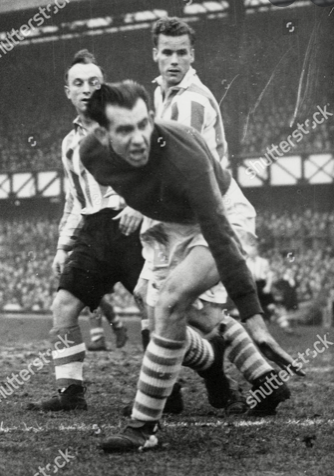 In what turned out to be his 59th and last appearance for the club he saved a penalty in a 2-1 win at Consett on Saturday 28th February. In the crowd that afternoon and suitably impressed with what they had seen were officials from First Division Huddersfield Town.
In what turned out to be his 59th and last appearance for the club he saved a penalty in a 2-1 win at Consett on Saturday 28th February. In the crowd that afternoon and suitably impressed with what they had seen were officials from First Division Huddersfield Town.
However, it was Sunderland manager Bill Murray who had been the first to be impressed by Harry.
Having registered their interest with Blyth officials, Sunderland were to pass up on their ‘first refusal’ on Harry to the help another club.
Huddersfield’s Blyth born manager George Stephenson, was in need of a keeper having lost long serving Bob Hesford to an injury.
On Saturday 21st February Hesford suffered a badly broken ankle in a 0-2 defeat at Sunderland, after the game the Sunderland manager told Stephenson all about Harry Mills.
Reserve Don Clegg came in for the next game, a 1-2 home defeat to Bolton Wanderers as Stephenson sent officials up to Consett to watch Harry in action.
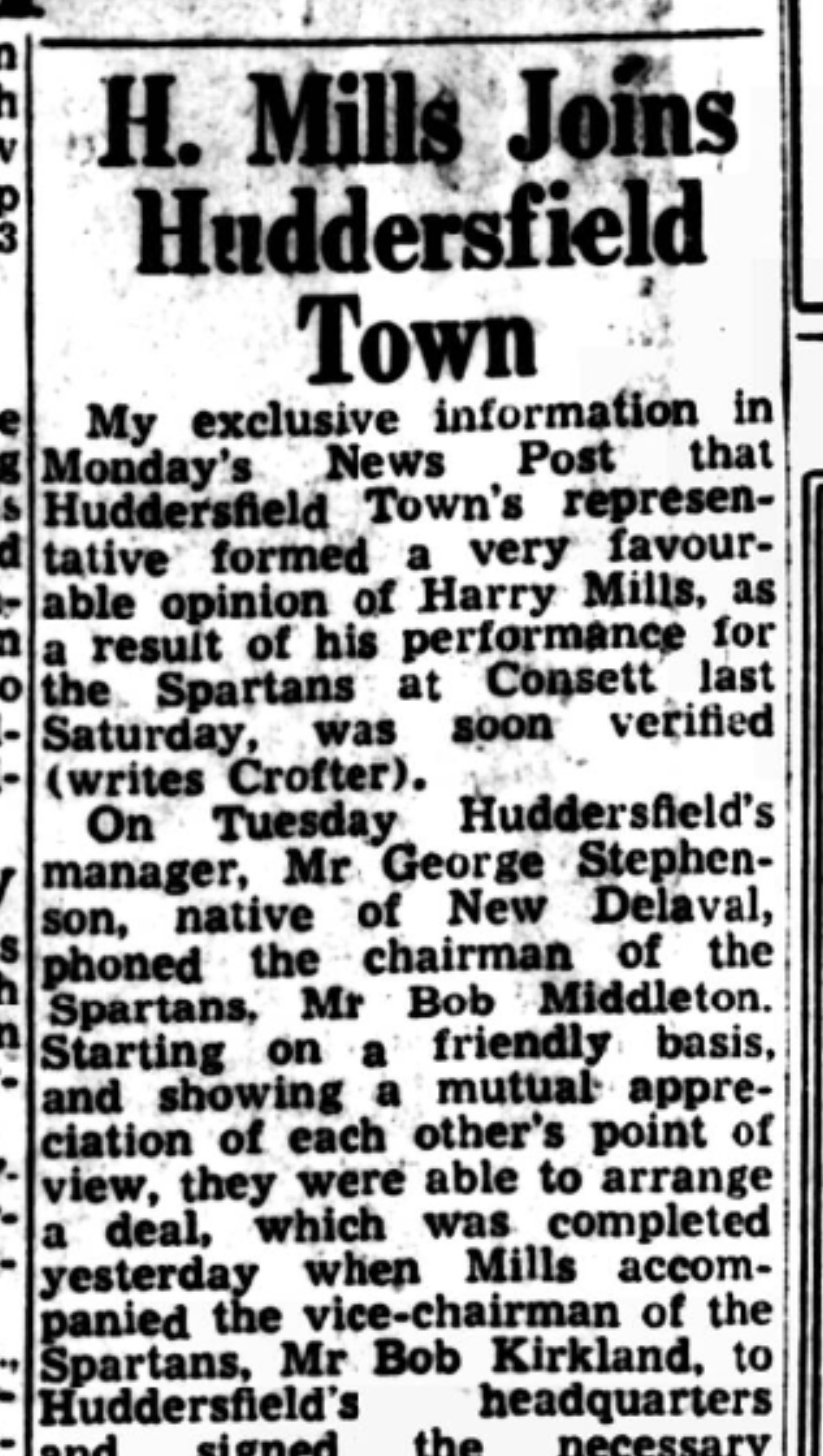 On Tuesday 2nd March, George Stephenson rang the Spartans Chairman Bob Middleton, they struck a deal that both clubs were happy with. The reported £850 was a club record at the time, but Middleton insisted on an extra fee being paid if Harry played a certain number of first team games.
On Tuesday 2nd March, George Stephenson rang the Spartans Chairman Bob Middleton, they struck a deal that both clubs were happy with. The reported £850 was a club record at the time, but Middleton insisted on an extra fee being paid if Harry played a certain number of first team games.
The very next day Blyth vice chairman Bob Kirkland drove Harry down to the Leeds Road ground.
The deal was signed and the 26 year old keeper officially became a Town player on Wednesday 3rd March 1948.
Don Clegg lasted just one more game between the sticks, a 4-0 defeat to Liverpool at Anfield, before Harry received his call up to the first team. George Stephenson’s side had succumbed to five consecutive defeats by then and found themselves 21st in the First Division.
Harry’s debut came on Saturday 13th March in a home game with Middlesbrough and he made an immediate impact, goals from Vic Metcalfe and Albert Nightingale sealed a much needed 2-1 victory.
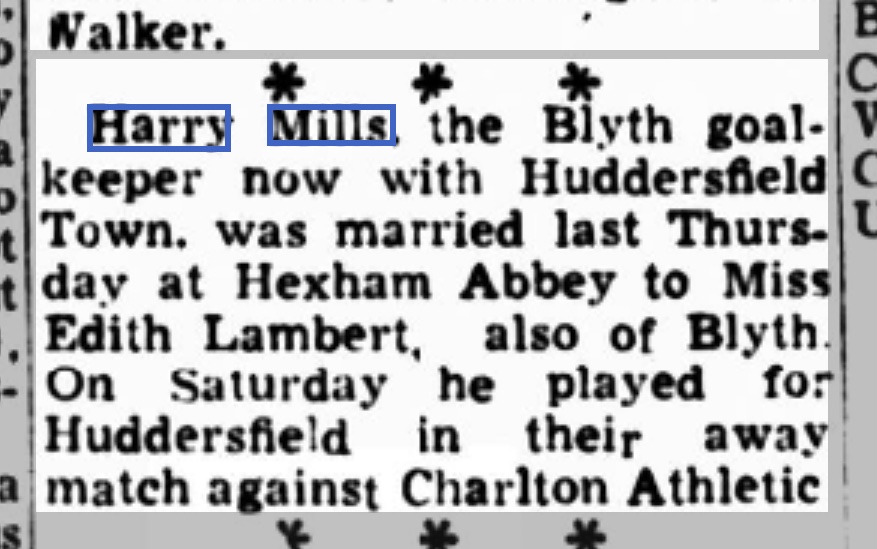 March 1948 proved quite an eventful for him, not only signing for Huddersfield Town but five days after making this Football League debut he was back up north preparing for his ‘big day’.
March 1948 proved quite an eventful for him, not only signing for Huddersfield Town but five days after making this Football League debut he was back up north preparing for his ‘big day’.
On Thursday 18th March Harry married Edith Lambert at Hexham Abbey, then he was straight back down to Yorkshire to meet up with his teammates for a trip to the capital to face Charlton Athletic on the Saturday.
Town went unbeaten in his first three games as he made the No.1 spot his own, he kept four clean sheets in the next ten games. They finished the season in 19th place, four points above the drop zone.
Town were so pleased with their new player that Blyth’s secretary Roy Robertson received a cheque off Town for the agreed additional fee within a month of signing Harry rather than after the set number of appearances.
In the summer of 1948 Harry and Edith moved into a new house, the club had purchased six properties in the town for their players and Harry was given one of them.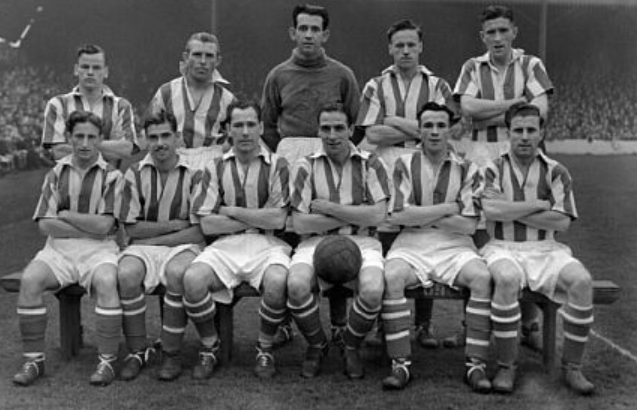 Bob Hesford was still out injured by the time 1948/49 came around, Harry retained his place in the first team playing in the first game of the season, a 1-1 draw with Arsenal at Leeds Road.
Bob Hesford was still out injured by the time 1948/49 came around, Harry retained his place in the first team playing in the first game of the season, a 1-1 draw with Arsenal at Leeds Road.
However, the club brought in Jack Wheeler from Birmingham City, where he’d mostly played in the reserves. The two keepers would spend much of the season battling it out for the No.1 spot, Wheeler went straight into the first team for the second game of the season against Derby County.
He remained in goal for the third game, a 3-1 loss to Charlton Athletic, but was dropped in favour of Harry who played the next two games before once again losing his place to Wheeler!
As the season progressed Harry got an extended run in the side, he played played 26 out of 42 league games.
The season was a struggle for Town once again, finishing just one point above relegation to the Second Division. George Stephenson’s side ensured safety with a 1-0 win over Preston North End on the last day of the season, having propped up the division for much of April.
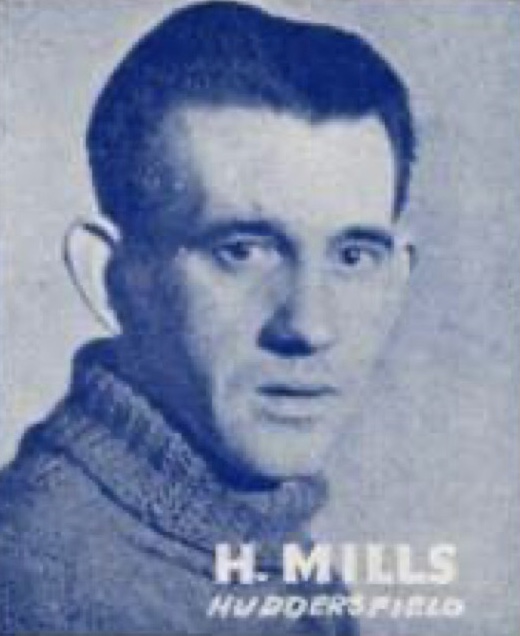 For the 1949-50 season, Harry was firmly established as the first team goalkeeper and missed just eight games, Bob Hesford eventually returned briefly in September before losing his place to Harry, Hesford would never play another game for the club and eventually departed in August 1950 to become a teacher.
For the 1949-50 season, Harry was firmly established as the first team goalkeeper and missed just eight games, Bob Hesford eventually returned briefly in September before losing his place to Harry, Hesford would never play another game for the club and eventually departed in August 1950 to become a teacher.
Jack Wheeler came back into the frame in January playing two game but Harry soon regained the keepers jersey for the rest of the seasons they finished in 15th place.
Under George Stephenson’s management it was constant struggle for Town as they battled to stay afloat in a league that they’d dominated two decades before. Although Harry proved to be the dependable keeper any side needs, it lacked the quality needed to compete at the higher end of the table.
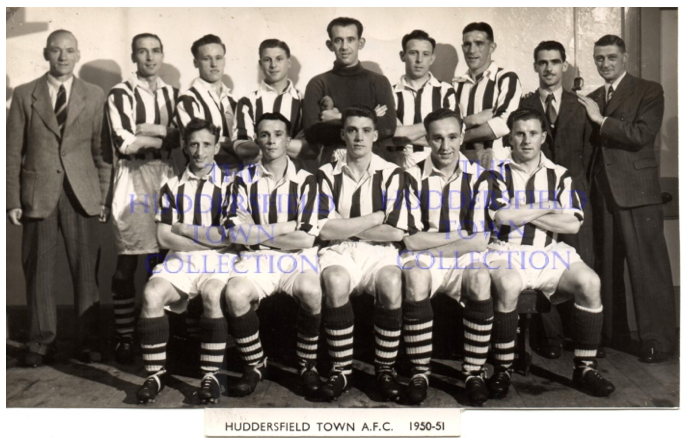 During the 1950-51 season, which Harry had started as the first choice he lost his place to Jack Wheeler after letting eight goals in a 0-8 defeat at Middlesbrough on 30th September.
During the 1950-51 season, which Harry had started as the first choice he lost his place to Jack Wheeler after letting eight goals in a 0-8 defeat at Middlesbrough on 30th September.
He was confined to the reserves for the rest of the season, barring a single first team game in March.
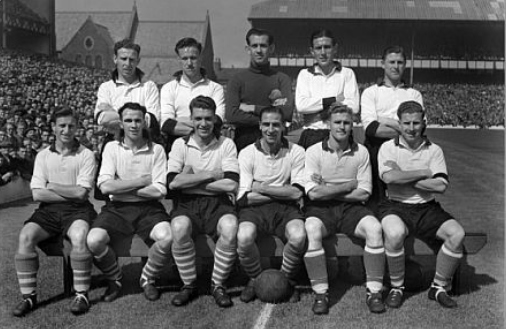 Harry briefly won his place back during 1951-52 but only for four games before being dislodged by Wheeler. In a season where Town remained in the bottom two from October onwards, it was a miserable season that was only heading one way, down.
Harry briefly won his place back during 1951-52 but only for four games before being dislodged by Wheeler. In a season where Town remained in the bottom two from October onwards, it was a miserable season that was only heading one way, down.
In the 25 players used that season, three of them were goalkeepers, with Harry and Jack Wheeler battling it out as usual and a third goalkeeper, Ronald Humpston who played five games between November and December.
Harry had an extended run in the side lasting from Christmas Day until April, the man who had given him his break in the Football League, George Stephenson, stepped down as Town manager on 11th March following a 0-2 home defeat by Bolton.
Former Scottish International Andy Beattie was eventually prized away from Stockport County to be the new manager in April by a reported salary of £2,500!
The new boss handed Jack Wheeler the keepers jersey for the final four games of the season, but it was too late to salvage the season and Town were relegated for the first time in their history.
For the 1952-53 season, the club’s first in Division Two since 1920, Beattie opted for Jack Wheeler as his goalkeeper at the start of the campaign.
Town won promotion finishing 2nd, losing out on the title to Sheffield United by only two points. Amazingly Beattie kept more-or-less the same team throughout the season. Just 15 players used all season and seven of them ever-present, unfortunately for Harry keeper Jack Wheeler was one of the seven and he spent the entire season in the reserve side.
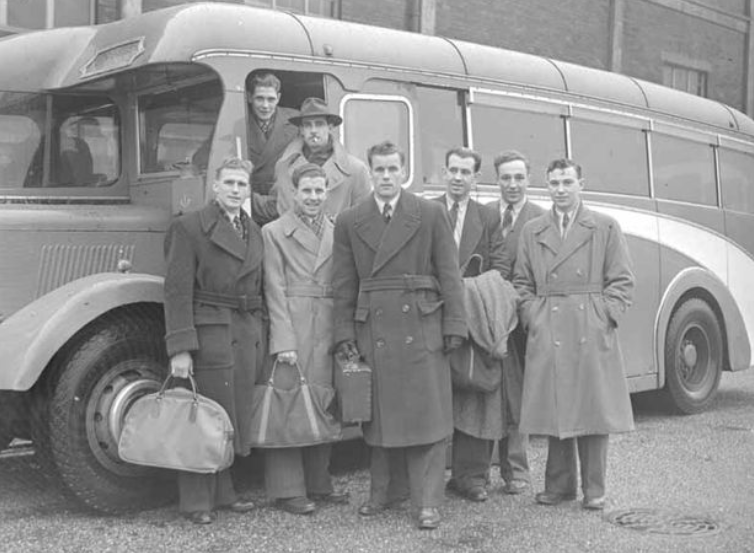
Harry, 3rd from right, and his teammates set off for away game at Arsenal.
Town continued the good run during the following season,1953-54, from October onwards, didn’t drop below 4th place until they eventually finished 3rd in Division One, their highest finish since the war.
Jack Wheeler began the season as first choice keeper but a hand injury in the second game of the season a 0-0 draw at Arsenal on 22nd August saw Harry back on the first team.
Despite over a year since his last first team involvement, Harry did superbly well on his long over due recall. Remaining in goal virtually all season playing 38 games and keeping 10 clean sheets during the season as Town finished 3rd.
Unbelievably after this great 1953-54 season Harry spent virtually all of the the following season back in the Reserves! He didn’t play a single first team game for Town in the 1954-55 season, as Jack Wheeler was back from injury and was preferred by manager Andy Beattie.
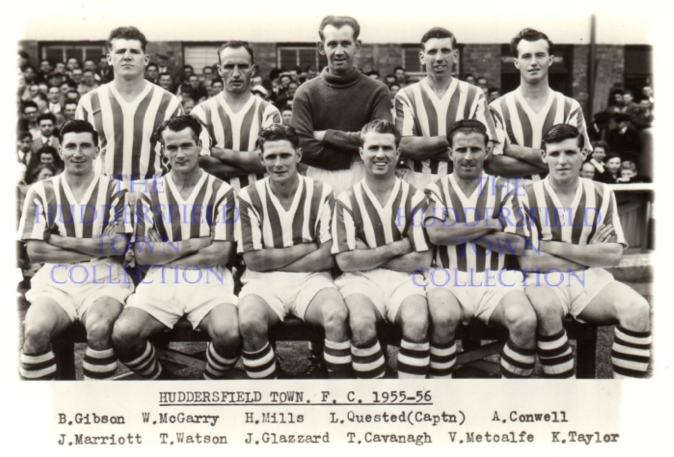 After his season in the Reserves Harry did win his place back for the 1955-56 season, though he played just 10 games before Wheeler was reinstalled as first choice.
After his season in the Reserves Harry did win his place back for the 1955-56 season, though he played just 10 games before Wheeler was reinstalled as first choice.
By the autumn of 1955 young keeper Harry Fearnley had emerged as another challenger to Harry for the No.1 spot. When injury kept Wheeler out of the side for a couple of games in October, it was Fearnley was picked over Harry!.
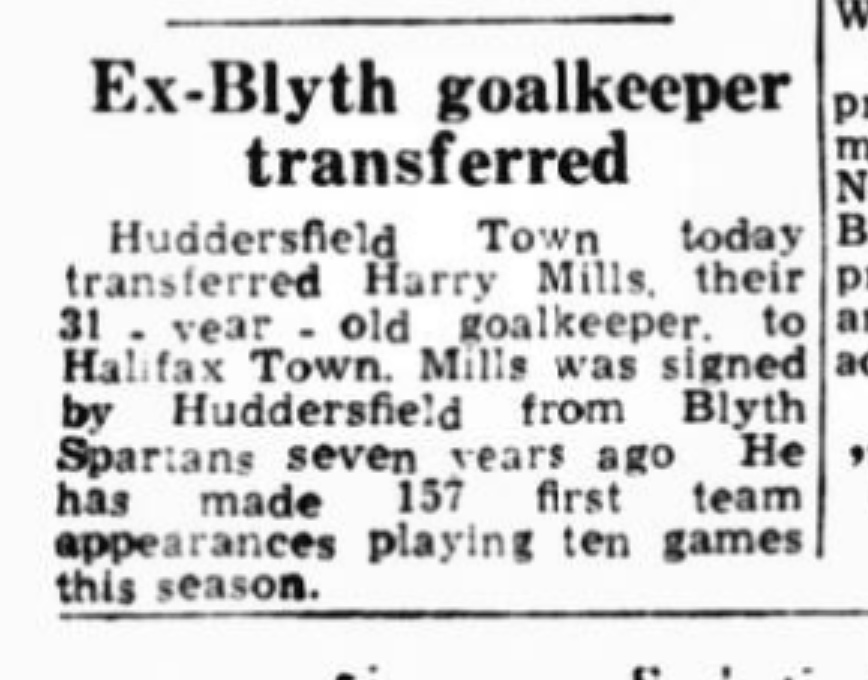 In December 1955, after seven years and 157 appearances Harry left Leeds Road to join Halifax Town in search of regular first team football.
In December 1955, after seven years and 157 appearances Harry left Leeds Road to join Halifax Town in search of regular first team football.
Upon leaving his departure was noted in the local paper with the following rather less than favourable write up:
“Mills was at times erratic, but when on top form he was cool, alert and daring, his height and reach enabling him to clear shots that would have beaten many goalkeepers.
It was very much a case of him either being absolutely brilliant or struggling badly, his form was often erratic”
His former Town teammate, Willie Watson was now the manager of the Third Division North team and knew Harry well so was able to beat off interest from Bradford City to his signature.
Upon signing the Halifax Daily Courier & Guardian stated that Harry was:
Considered one of the most agile and courageous exponents of his specialised craft the First Divison has known since the war.
At the Shay he would compete with Arthur Johnson for the jersey, and had to wait until February 1956 before getting into the first team.
Saturday 16th February’s home game with Mansfield was this debut, making some inspired saves on an icy pitch as the Shaman recorded their eleventh home won of the campaign.
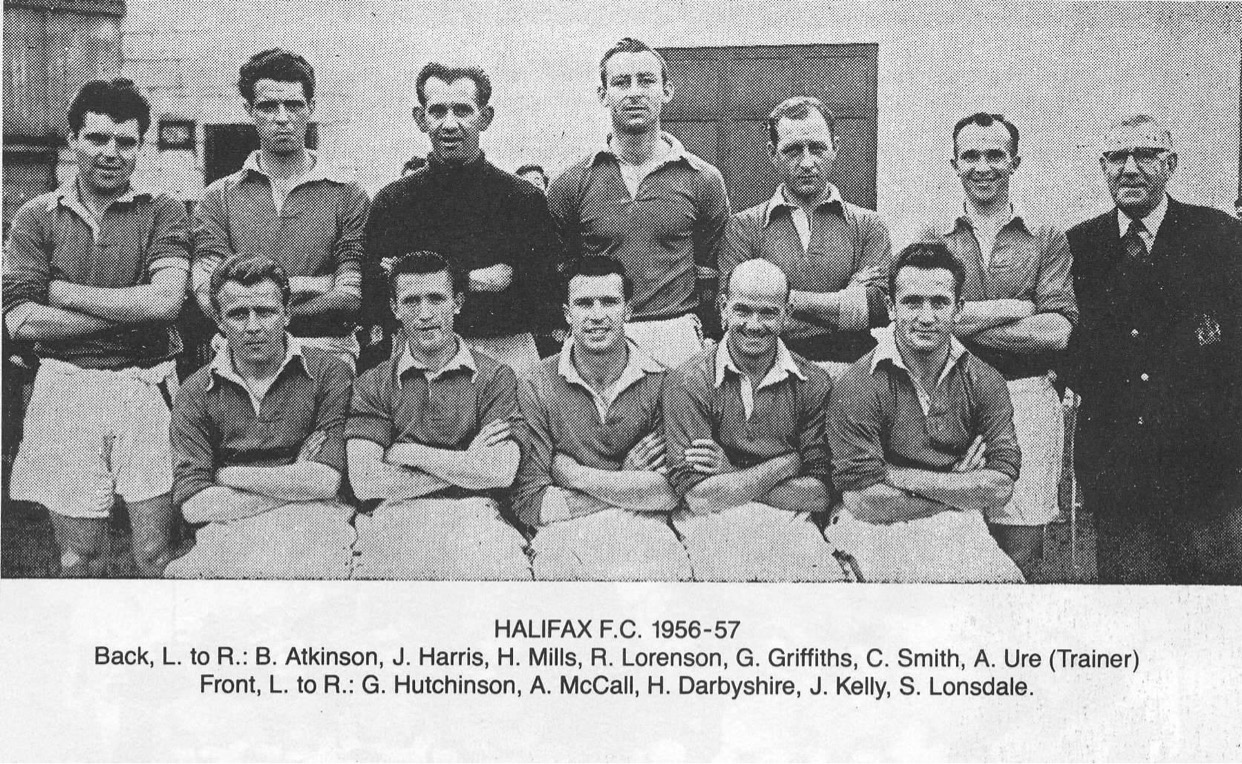 However, after only three more starts and following a 3-3 draw at home to Gateshead on 10th March, Arthur Johnson was reinstalled as first team keeper and kept his place for the rest of the season.
However, after only three more starts and following a 3-3 draw at home to Gateshead on 10th March, Arthur Johnson was reinstalled as first team keeper and kept his place for the rest of the season.
By then Willie Watson had resigned and coach Bill Burnikell was promoted to manager, he gave Harry an extended run in the side during the first half of the 1956/57 season, leading to Johnson asking for a move away.
However, Burnikell’s resignation in December 56 led to the team election being made by he club’s committee. Chairman Harry Taylor, director Vivien Booth and trainer Allen had the final say and they elected to reinstate the now transfer listed Arthur Johnson back to the first team for the rest of the campaign.
After only a year at the Shay Harry decided to leave, a lack for first team football and life away from the game becoming more important it was an easy decision.
His wife Edith was experiencing ill health and they decided to move back home to Blyth to be with family.
Upon his return to the North East unsurprisingly there was interest form several clubs but there was only the place the 35 year keeper wanted to play, Croft Park.
Having always been hugely popular in his home town, his progress in the Football League had been keenly followed through the updates and the writings of the man that had who had first brought him to the club, Blyth News reporter Bob Thompson aka Crofter.
The clubs Secretary/Manager Dougie Wright acted quickly and Harry was installed as first choice keeper for Spartans 57/58 North Eastern League season.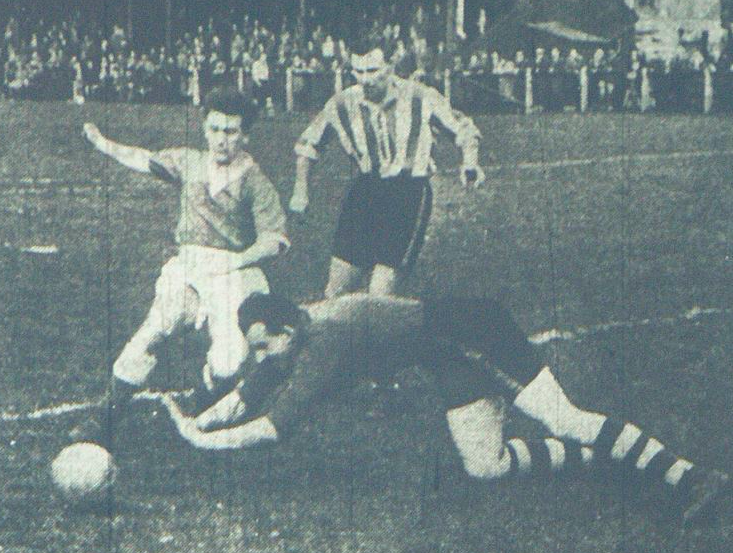 He made his return debut on Saturday 24th August 1957 but couldn’t prevent the Spartans falling to a 1-2 home defeat to Consett. He played in 36 consecutive games in that first season back before missing the last three games of the season, Tommy Orr replaced him.
He made his return debut on Saturday 24th August 1957 but couldn’t prevent the Spartans falling to a 1-2 home defeat to Consett. He played in 36 consecutive games in that first season back before missing the last three games of the season, Tommy Orr replaced him.
Orr had ended the previous season as first choice but had stepped back down into the reserves when Harry came back.
The North Eastern League folded at the end of that 57/58 season, with falling member numbers in recent seasons the withdrawal of the six Football League Reserve sides spelled the end of the league that had ran since 1906.
The Spartans joined the Midland League, in the clubs two seasons in that league Harry played in all but three of the 68 games.
 1958/59 brought him his first winners medal in mens football, Blyth fought their way to the Northumberland Senior Cup Final.
1958/59 brought him his first winners medal in mens football, Blyth fought their way to the Northumberland Senior Cup Final.
A 7,840 crowd at St James’ Park saw Blyth arch rivals Ashington 2-1 thanks to an 89th minute winner by Bob Nickalls.
Harry was an ever present in 59/60 as Blyth finished 5th once again, conceding only 56 goals in the 38 games played that season and had another appearance at St James Park as Blyth reached the Senior Cup Final again.
However, it was only a Runners Up medal that season as a 7,165 crowd saw North Shields claim the trophy with a 1-3 victory.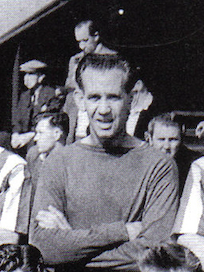 The following 1960/61 season saw Harry play in yet another new league for him and the Spartans.
The following 1960/61 season saw Harry play in yet another new league for him and the Spartans.
The Midlands League folded due to financial problems after the 59/60 campaign so along with the other member clubs, Blyth transferred across to the Northern Counties League.
Harry played every minute of every game that season which only managed to start after the NCL created a League Cup competition to be played before the actual league campaign.
With only 18 clubs the league had to act to ensure the competition ran the full length of the season.
In the 18 league games Harry conceded 22 goals as Blyth finished 3rd, they also reached the League Cup Semi Final having finished 3rd place in the League Cup mini league competition.
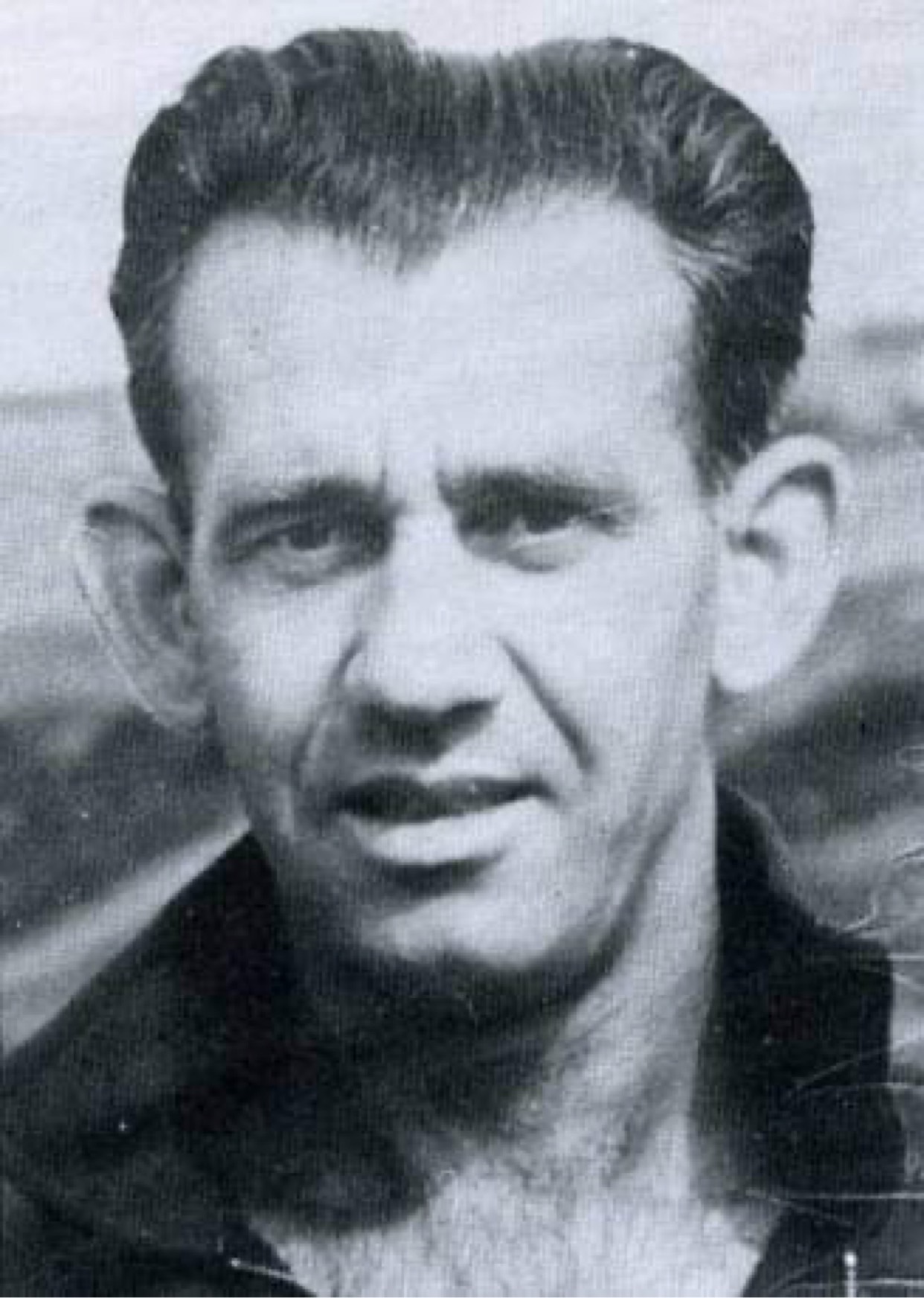 The 1961/62 campaign proved to be the final one for Harry, now aged 38 he made 23 appearances before hanging up his gloves.
The 1961/62 campaign proved to be the final one for Harry, now aged 38 he made 23 appearances before hanging up his gloves.
His final game game on Saturday 24th February 1962 was his 240 appearance for his hometown club.
He had helped the club get established again after the war and had become a real hero to his fellow townsfolk when he moved to Huddersfield Town. His return to the club in 1957 elevated him to iconic status with the fans.
His life after football saw Harry became a well respected painter and decorator in Blyth working for the Co-Op, sadly he passed away on 14th August 1990 aged only 68.
Harry Mills is a legendary Spartan, and a true all time great of the club.
His footballing fame and popularity in hometown made him one of the Blyth’s truly legendary figures.
—————————————————————-
Credits, Acknowledgements & Thank you’s:
Halifax Town historian Johnny Meyhell for supplying the information and images of Harrys time at the club.
Huddersfield Town historian Lee Morris for supplying the information of Harrys time at the club.
The late Ken Sproat’s superb book ‘The History of Blyth Spartans’ was as ever an important source of information.
The superb British Newspaper Archive was a vital source of info on Harry’s career.
The following websites provided important info and images –
https://www.petespicturepalace.co.uk – @PetesPicPalace on Twitter
https://www.examinerlive.co.uk/
https://huddersfieldtowncollection.wordpress.com
Blog Ping
Hostgator promo codes
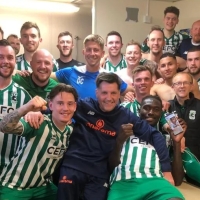
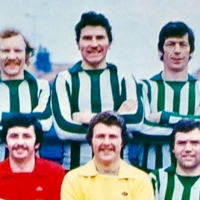
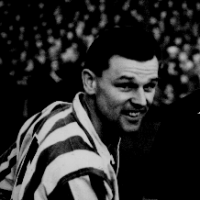
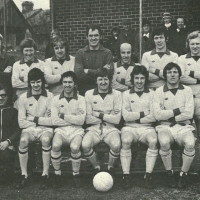
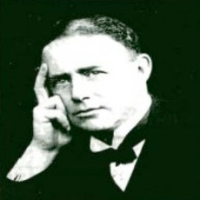
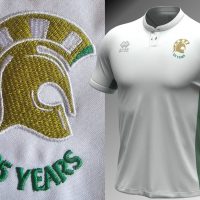

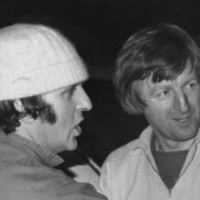

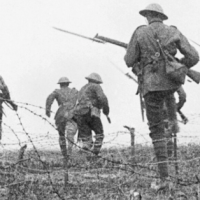
Pingback: Blyth Spartans team photograph archive | Blyth Spartans AFC – making history since 1899